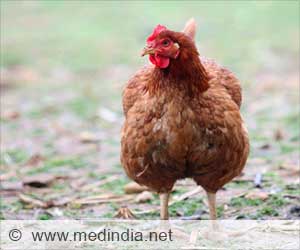Two Indian laboratories have confirmed a fresh outbreak of bird flu in Manipur, in the north eastern region. Massive culling of birds is to start Thursday. No human case found thus far.
Just a year after battling bird flu virus in Maharashtra in western India and declaring the country free of the virus, Indian health authorities are acknowledging a fresh outbreak, this time in Manipur in northeast.
The High Security Animal Disease Laboratory in Bhopal and the National Institute of Virology in Pune have confirmed the presence of the H5N1 strain in a backyard poultry farm near Imphal, Manipur’s capital.The federal and state governments had put all systems on alert after the labs sent in their reports on samples from 132 chickens that died in a backyard poultry farm in Chingmeirong village in East Imphal district. The reports said that seven of the eight samples tested positive for bird flu.
As part of control and containment, the state government has already killed the remaining birds in that farm and has disinfected it.
Twenty teams will begin culling of an estimated 1.5 lakh birds tomorrow within a 5-km radius of the location, said the director of veterinary and animal husbandry in the Manipur government. This operation could last five days.
As per procedure, compensation for the loss of each bird will be paid. The region will then be disinfected and kept under constant surveillance to keep track of any infection of humans.
Twenty one persons associated with that Chingmeirong unit have been thoroughly checked but no human case was found, said a Union Health Ministry official.
Advertisement
A 10-bed isolation ward has been set up at the Jawaharlal Nehru Hospital in Imphal so that human cases, if any, are quarantined there for treatment. The Government said the entire region would be kept under surveillance for the next three months before it can be declared free of bird flu.
Advertisement
But he also noted the disease appeared “very localized,” being limited to just one unit in that village.
Sohoni said it will take some time to confirm if it’s the H5N1 strain which was detected in last year’s outbreak.
In addition, the government will carry out an intensive clinical and biological survey of the birds in a 5-10-km radius, said Sohoni. The Centre has already sent 40 health teams that will keep a watch on the 4.5 lakh people living in that area over the next 10 days.
The state government has made arrangements for the quarantine of members of the 20 squads that have been constituted for carrying out the culling, sources said. Each team will have a veterinary doctor and four field staff.
Incidentally, Manipur banned the import of poultry products from Myanmar following reports of avian flu outbreak in Yangon a couple of months ago; Nagaland, which shares a porous border with Myanmar, took preventive measures educating poultry farmers on bird flu.
On March 20, the Centre issued a general alert following reports of bird flu in Bangladesh and Myanmar, following which Mizoram imposed a ban any official or unofficial trade of poultry and related products from the two countries. Similarly, while the Assam government sent teams of vets to districts bordering Bangladesh, Meghalaya constituted a task force to keep the state on alert.
Two labs confirm it’s the “highly pathogenic” H5 strain but the government is still testing for the N subtype. The H subtype governs ability of the virus to enter cells; N, the release of new virus from cells. There are 9 types of H5, some highly pathogenic, some pretty harmless. Worrying one is the H5N1 strain found in Maharashtra outbreak.
A senior official has confirmed H5N1 has indeed been detected in Manipur. Even if it’s some other strain of N, large scale culling has to be resorted to as the virus could mutate to a more deadly form.
After the outbreak in Feb 2006, control and containment were carried out in affected areas, more than 170,000 samples have been tested since. No fresh outbreak was reported after April 2006. When no fresh cases are reported within six months of an outbreak, the region is considered free of bird flu.
Incidentally the Indian poultry industry does not seem to be too worried this time. This is a remote village, it has affected backyard poultry in one farm. No trade of eggs or meat takes place there.
However, some exports may be hit as there are extra-cautious countries which don’t accept meat or eggs from countries where bird flu has been detected.
Source-Medindia
GPL/C




